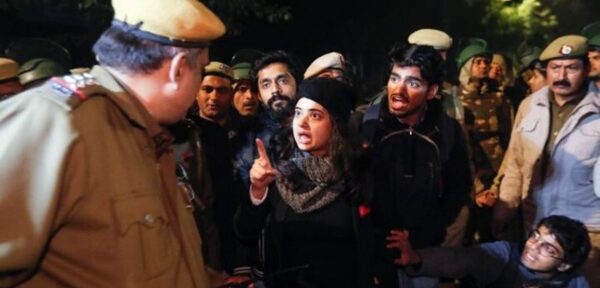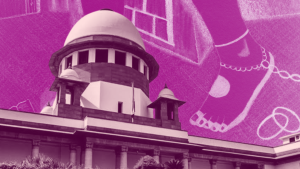NRC-CAA : More Legal Feet required on the Ground

India is seeing a massive countrywide resistance against discriminatory citizenship measures and women are leading it. Women across states have been resisting on the streets, inside universities and outside of it. This has seen a spate of police brutality and high handedness of the state in many parts as protestors are being detained and even arrested on flimsy grounds.
While India resists on the streets, the legal fraternity has stepped up in joining the resistance with crucial legal support on the ground for detainees as well as spreading legal awareness. Women lawyers across states have been playing an important role in coordinating legal help at police stations, ensuring protestors are aware of their rights and representing them in court in the event of their arrests.
‘We need more legal feet on the ground as protests intensify and the state cracks down’, says Mishika Singh who started a legal support group called ‘Lawyers for Detainees’ in Delhi. The group has now expanded to several cities in India.
The Government of India has legislated the Citizenship Amendment Act, 2019 which gives citizenship to persecuted minorities from neighbouring countries excluding Muslims. Additionally, it has announced the implementation of a National Register of Citizens, which demands documents of ancestry for future citizenship. Together these two instruments,as political scientist Professor Niraja Gopal Jayal explains, will lead to radical transformation and exclusion to India’s idea of citizenship.
In the first part of documenting the role of women in the anti CAA and NRC resistance, we spoke with Saima Khan from Shaheen Bagh in New Delhi, where Muslim women have been leading a continuous sit-in for more than a month. In the second part, Tazeen Junaid, a student of Aligarh Muslim University talks about how women students are carrying forward the resistance movement in the face of indefinite closure of the university following police violence. In the third part of the series, Debsmita Chaudhury of Jadavpur University tells us why she chose to use her convocation to express her dissent on stage.
In this interview with BehanBox, Mishika Singh, an advocate in the Delhi High Court, tells us how the legal fraternity consisting of mainly women lawyers have been working round the clock in providing legal support, the nature of police high-handedness and harassment women lawyers have received for their support to the resistance.
How did the Lawyers for Detainees come into being?
Lawyers for Detainees came into being on the 19th of December, after the police brutality on the campus of Jamia Milia Islamia University in New Delhi.
When violence against the students took place on 15th December, a team of lawyers was already working with the students. Soon we figured out that we needed more lawyers on the ground as more protests against the NRC and CAA were breaking out and more people were being detained. So I formed this group on whatsapp and sent out the link to other legal groups that I am a part of and lawyer friends of mine. Within a couple of hours we had about 250 people on the group who were actively participating- figuring out where the protests were happening, trying to reach there. It started with Delhi ensuring that detainees were represented in protests without police high-handedness. In the Delhi group, we have about 150 people, out of which around 40-50 are usually on the ground or on standby. There are activists as well in the group. Then there are people who have a law degree but have not been practicing, so they are available in case detainees need them
Among the Delhi group, most of them are women lawyers. Once that message got out, I started getting calls from different cities as well. So then I set up a ‘Lawyers for Detainee Group’ for different cities and states as well.
How are these groups organized in different cities and states, especially where protests have been cracked down upon by the state?
We have one main one for UP and separate ones for Gorakhpur, Bijnor, Rampur and Muzaffarnagar. We also have groups for Chennai, Bangalore, Bombay, Patna. The Patna group also covers Aurangabad and Zafarpur.
Wherever there is active violence, we’re trying to have a smaller group there to coordinate services for the area.There are at least fifteen such groups out there currently.
How does this group work from the time that a protest is announced? Do you jump into action after people have been detained or does your preparatory work start before?
We have tried to have lawyers on the ground whenever there is a protest. For example, if there is something happening at Jantar Mantar, we try to have at least a couple of us on the ground letting us know what is happening. Apart from that I am also in touch with a number of protestors. So, in case there are no lawyers available in the protest, they let us know about the presence of the police and riot force.
Usually we have a team at the police station, which is the closest jurisdiction to the protest area. So in case of protests at UP Bhawan, we have people at Mandir Marg police station in Chanakyapuri.
Once the detainees get there we briefly tell them the procedure and how long it is going to take. We also tell the detainees to not resist or not get violent during detentions because then it becomes a two-way fight. So those are the kinds of simple messages that we send out.
In the case of detentions, what is your role as lawyers and how do you help the detainees?
Normally police detains protestors as a preventive measure to make sure that people are not collecting in a pace they are not supposed to. But the Delhi Police is obviously not being respecting that. I don’t know if that’s the state in other cities as well but even in UP, a lot of people were detained at a place where they were told that section 144 has been imposed but no copy of the order was made available. So in such situations, we make sure that detainees actually ask for a copy of the 144 order because of which they have been detained. Those are the kind of things that we take care of.
In the event of detentions, we know for a fact that most detainees are let go after 5- 6pm. So we stick around until then. We make sure that the detainees are not being harassed about things. For example, at a lot of places, there are adult women detainees whose parents’ name or father’s contact number is asked for which is absolutely unnecessary. We see to it that detainees are not forced to do something that they are not required to do under law.
What happens when detainees are arrested? What legal support do you organise in such instances?
In such cases where detentions turn into arrests, we now have teams that take care of people arrested. Now we have separate teams that have been helping to get bail, coming up with the strategy if the bail is rejected and who would be available to argue the matter in court. Teams have been working at Tees Hazari, Daryaganj, Seemapuri Police Station and Ghaziabad.
What role have women lawyers been playing in this resistance movement?
In Delhi, 60-70% of legal aid is coming from women lawyers. Even in other states prominent women lawyers are at the forefront but I am not sure of the percentage. Women lawyers are turning up even late at night when there is a need.
Even after cases were registered against detainees, the cases are mostly being led by women lawyers at most of these places. Some of them are senior women lawyers like Rebecca John and Nitya Ramakrishnan. So there is a very active participation of women in the legal fraternity, who are taking the lead. They’re present on the spot on the ground, at police stations, at protests. That’s something very great about this resistance- just as women are leading these protests, women lawyers have been at the forefront of legal support.
One of the sites for unlawful police detention was in Daryaganj on 20th December 2019. Give us a picture of what happened and how legal help was given.
We had just started the Lawyers for Detainees Group a day before the Daryaganj incident on 20th December 2019. I was at the India Gate protest with a couple of other lawyers when the Daryaganj incident happened where people who were protesting in the area were held at the police station and later charged. There was an SOS message from Pinjra Tod, the women student group, and I reached there along with two other lawyers. Before we reached, there were only two other women lawyers there and absolutely no civilians.
We could see the personal belongings of those who had been there on the roads. There was blood, there were watches, footwear and clothes lying around. There were about 300 policemen there. It was only much later in the night, around 9:30-10 pm that about 40-50 lawyers collected. After we tweeted, the media came to cover the incident.
That incident taught us a few things. One, that we had to have boots on the ground if we wanted to contribute in a meaningful way. Two, no two days are the same and hence we needed to make lists everyday about protests and needs on the ground, so that legal help can be organised quickly.
What was the attitude of the police, especially in Delhi, towards detainees and lawyers such as yourself?
The police has been very hostile, especially in certain locations. They were much more hostile at Daryaganj,where the detainees were mostly Muslims than at Mandir Marg in a more cosmopolitan area of South Delhi. The demographic of the region shapes the attitude of the police.
Police at Daryaganj was very hostile even towards the lawyers. They refused to talk to us initially. It was only when they realized that that we are not going to leave, they softened a bit. I ended up staying till 6 in the morning. Two lawyers went to two different magistrates’ houses to get an order saying that minors have to be released. That’s basic law. Police knew that they were wrong to detain minors but were still actively hostile.
At Mandir Marg, because the profile of the protestors was different, so was their attitude. They were okay with lawyers meeting the detainees. Detainees had their phones and they were making calls, they were tweeting.
Overall, I would say it’s been very non-cooperative. Because a lot of people who were detained were not shown the 144 order, were not told where they were being taken, or were given the wrong information about where they were being taken.
What about Uttar Pradesh? What are the challenges that lawyers are facing where there is a complete breakdown of the rule of law?
In UP, what is happening is that the number of lawyers on the ground is much less than the current need. The FIRs are very cleverly worded and they are framing charges as well. So if someone is being hit or even killed, they frame it as if a protestor has attacked them. This is going to form the basis of all the cases
Another thing UP police has been doing is that they have 200-300 unnamed people. This is also happening in Ghaziabad. After the protests, the police have been going to people’s houses, or giving them a call, asking them to come to the police station. When asked for the reason or the order copy, there is absolutely no response. The police come to their houses and knock every day without any warrant or official papers.
Most of the FIRs only have Muslims or the majority are Muslims. I think that only Phulwari Sharif is only one place that out of 40 arrested, there was almost an equal number of Hindus and Muslims.
The police are supposed to give the FIR copies to the accused and to the lawyers. To get an FIR quashed we need a copy of the FIR.Same with an order that is being passed. If the lawyer wants to appeal against an order, the order is not available. The police is also keeping a lot of papers with them and not releasing them when they are supposed to.
How will this stand legally in terms of further scrutiny tomorrow? How is it going to work out for the people that are being accused?
We need to realize that essentially the machinery is mostly working from one side which is against the protests. That’s why in most of the cases the bails are being denied. In Delhi especially, at one area, the people that were arrested were charged with attempt to murder. And there’s no evidence to that. Attempt to murder is a very grave charge to be put on someone who was taking part in a protest. So, the provisions or the charges themselves are framed so aggressively that by the time you prove whether it was right to wrong, it’s going to take some time. Most of these offences that they are being charged with are non-bailable. So bail becomes the discretion of the magistrate, who is unlikely to give bail.
Are all those who were denied bails protestors?
A lot of them have claimed to be just passing by protests who happened to be there and they were picked up because of their religious identity. This happened a few days ago at Saket Police Station in South Delhi. A man who had a Muslim name was beaten up. Targeting because of religion is something that we can see very openly with institutional support.
Do you think the protestors know their rights and how are legal groups creating awareness?
I think the situation has changed from the start of the protests to now in terms of how informed these protestors are. Usually when the lawyers are on the ground, they make sure that they talk to the protestors and inform them. When I see people going for the protest on the metro, I give them my number and tell them what they’re supposed to do. Simple things like if someone is taking away your phone, ask for a receipt. Or if you can video record a thing that is unwarranted try to make a video. If you are detained, share your location with someone who is not there on that bus. On Social media like Instagram etc. there is a detailed list of the do’s and don’ts- both legal and non legal- for everyone going for the protests.
Have women lawyers faced harassment?
Yes, we have. Every day I have to block at least five numbers. Harassment is also a lot of unwanted calls and pictures and videos especially now that my number is public. On a phone call I am able to give it back to them. I won’t be surprised if it has happened much more in other cities.
The important question is where do you go and complain if you are being harassed? We are fighting against the police every day. There’s a cyber cell, but in between all of this, I personally haven’t gotten much time to go there. There was a team that was only working on taking down numbers of those who have been calling and harassing and reporting them to the cyber cells. That is also something that is continuously being taken care of.
We believe everyone deserves equal access to accurate news. Support from our readers enables us to keep our journalism open and free for everyone, all over the world.




